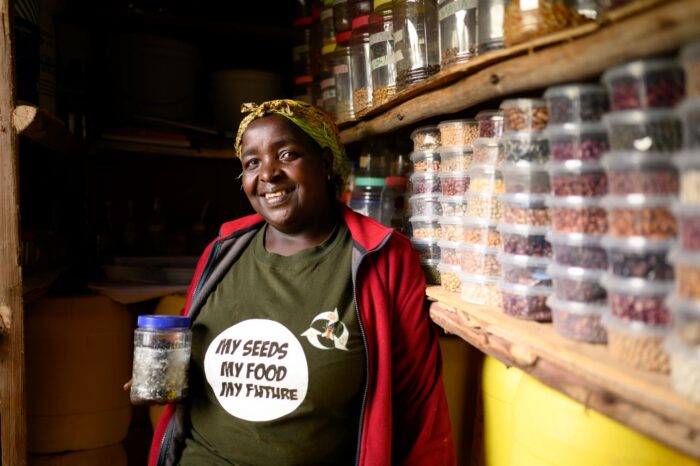Would you eat food contaminated with pesticides? Beatrice didn’t want to, either.
November 25, 2022Here are two things you might not know about Kenya.
First, kale and other leafy greens are a staple in Kenyan cuisine, where they’re used in many nutritious and flavourful dishes.
Second: up to 90% of local vegetables in Kenya are contaminated with pesticides, due to farming practices that put the health of both farmers and consumers at risk. And tragically, kale is the worst culprit.

As most of us would, Beatrice Wangui finds this alarming. But until recently, the mother of 5 from Langalanga had no other option. Her small plot of land was rocky and impossible to farm, so she relied on the vegetables her husband brought home from the market, after his days as an agricultural labourer.
“Sometimes he would be late and I would get angry”, she recalls. “And I didn’t feel safe with the vegetables he brought home since people are spraying chemicals on the food”.
Thankfully, Beatrice found an empowering solution, thanks to you.
Like Nancy, Beatrice is one the first women to learn about spiral garden farming from our local partner Seed Savers Network Kenya.
Today, Beatrice has a thriving organic farm sitting on top of her rocky plot of land!
Like most agroecological innovations, moving to adopt spiral gardening might seem simple after the fact. But the truth is, Beatrice had to work hard to learn and apply the new skills she needed to be successful.
In our year-long training program, she learned how to:
- build her own spiral gardens, using recycled materials
- make high-quality organic compost to nourish her gardens year-round
- protect her crops from pests using only organic methods
- save her own seeds instead of buying commercial varieties
- teach other women in her community about seed saving and spiral gardening.

Today, Beatrice is proud to call herself not only an organic farmer, but also a seed ambassador.
“When I come back from my training, I teach the women group I lead how to harvest seeds from the first crops that sprout, the most healthy. We no longer depend on expensive and sometimes fake seeds that fail to germinate.”
Beatrice Wangui, Langalanga, Kenya

Next Tuesday is Giving Tuesday, and our goal is to raise $32,000 to offer this life-changing training to 250 other women farmers.
In the meantime, here’s how you can help:
- Forward this message to friends and family!
- Visit our website to learn more about our transformative spiral garden program